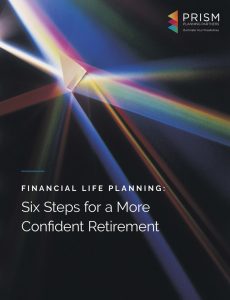It’s become apparent that we’re living in abnormal times. Some folks have asked us if a downturn in the market might represent a good time to invest. It’s a fair question and one that’s definitely NOT one-size-fits-all. The changing economy represents different things to different households, and as such, we recommend that you consult a financial professional who can help you make this decision with a full picture of your unique situation.
Are you on the right financial path? Contact Prism Planning Partners today!
With that disclaimer aside, is now a time to put your money to work? Let’s examine a few high-level considerations.
Make Sure You’re Prepared
Before exposing your hard-earned cash to any sort of market risk, it’s important to make sure you know what you ought to expect. Consider asking yourself these three questions before jumping into the market:
1. Do I Have a Sufficient Emergency Reserve?
In today’s world, many households are losing income through no fault of their own. It’s more important than ever to make sure your family has sufficient liquidity, not subject to the risks or volatility involved with investing. We typically advise holding 3-6 months of household living expenses in cash.
2. What Is the Purpose of this Money?
Will you need to access these funds in the next three years or less? If you may need to spend these dollars or fund an emergency reserve, you should think twice about exposing it to market risk. True, in times when the market is down, it may be tempting to try to seek extra gains for an upcoming obligation. But, especially with the current driver of the most recent market downturn, we don’t know if a worsening of the pandemic could make the market correct even further. You need to be willing to stomach a potential prolonged downturn and weather that storm; a challenge if the money is “spoken for.”
Conversely, if this is money you can afford to lose should the market dips (say, for retirement in 10+ years), a market downturn could represent an opportunity to buy.
3. What Is My Appetite for Risk?
Recently, the market has swung in just one day as much as it may typically move in an entire year. Even if your surplus cash has “no strings” attached to it, make sure your stomach can handle an unpredictable stock market. If you frequently check your account balances and worry that you might “lose it all”, investing in markets like this might not be suited for you.
How Much, When, and What?
Let’s say you’ve passed the preparedness test. The next questions are still difficult – how much surplus money should I invest, and when is a good time to do so? And, of course, what should I invest in?
The first question is somewhat straightforward – invest as much money as you’re prepared to fully lose. A fundamental belief of traditional financial planning is that stocks are inherently risky, regardless of the company behind them. Before jumping into the market, it’s important to know that no such thing as a risk free stock exists. Sure, it’s less likely that a company in a stable industry that’s consistently paid a dividend should falter.
But solvency and dividends are not guaranteed. Looking at the 2008 financial crisis as a recent example – long-standing companies did falter. In this crisis, we’ve yet to determine the winners and losers – so it’s best to not bet solely on a particular company, industry, or even sector.
The second question is unanswerable. It’s nearly impossible to time the market, as it moves in cycles that are often exacerbated by algorithms. In fact, as of 2009-10, anywhere from 60-70% of U.S. trading has been attributed to high frequency trading. What does this mean? Traders can enact an automatic sell order when a given security reaches a particular price. When countless orders like that are executed simultaneously, it can lead to panic and cause even more sell orders to be placed rapidly.
Beyond the fast-paced digital element, however, the human component plays into market timing, too. Certainly, volatile markets make some investors more skittish than others. But, even the most level-headed can feel overwhelmed in markets like these when they feel the impact of factors beyond their control. In fact, a study by Morningstar reflects that the loss of unwisely timing a market costs investors between 100-150 basis points annually.
You may be feeling dismayed that the computers are faster than you- and they are. But, in long-term investing, timing isn’t everything. According to Dimensional Fund Advisors, “capital markets have rewarded investors… who have remained disciplined in the face of short-term noise. By focusing on things they can control (like having an appropriate asset allocation, diversification, and managing expenses, turnover, and taxes), investors can better position themselves to make the most of what capital markets have to offer.”
The third question of “What should I buy?” is what the financial industry wants to help you answer. Buying a “hot stock” might sound appealing now, but could prove detrimental in the long term, as mentioned above. This is where enlisting a financial advisor could be key. They should help you develop a financial plan; quantify your risk tolerance; set an appropriate asset allocation; monitor and review ongoing; and hold you accountable to the plan.
In conclusion, we don’t precisely know if now is the “right time to buy.” If we did, we’d probably have a different profession! One thing we do know is that it’s an appropriate time to review your financial plan (or create one if you have not done so). Make sure you’re on track with your stated financial goals, and better yet, check in with an advisor if you feel uneasy.
Prism Planning Partners, LLC dba Prism Planning Partners is an SEC Registered Investment Advisor. We are located in Libertyville IL. We specialize in fee-based, comprehensive financial planning and investment management. We are a group of CERTIFIED FINANCIAL PLANNER™ professionals dedicated to helping our clients achieve their retirement goals. Contact us today.
 Download our eBook today!
Download our eBook today!
(1)Beattie, Andrew. “10 Risks That Every Stock Faces” Investopedia. 25 Jun 2019. https://www.investopedia.com/articles/stocks/11/risks-every-stock-faces.asp
(2)Seth, Shobhit. “The World of High-Frequency Algorithmic Trading.” 30 Apr 2020. https://www.investopedia.com/articles/investing/091615/world-high-frequency-algorithmic-trading.asp
(3)Wendel, Steve. “Emotional Investing: What It Costs, and What to Do About It.” Morningstar. 21 Sept 2018. https://www.morningstar.com/articles/883178/emotional-investing-what-it-costs-and-what-to-do-about-it
(4) Merton, Robert. “Timing Isn’t Everything.” Dimensional Fund Advisors. 01 Jul 2019. https://us.dimensional.com/perspectives/timing-isnt-everything



